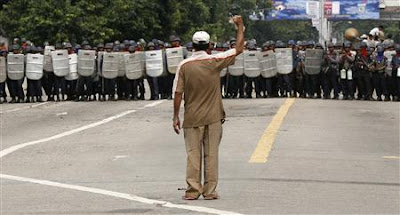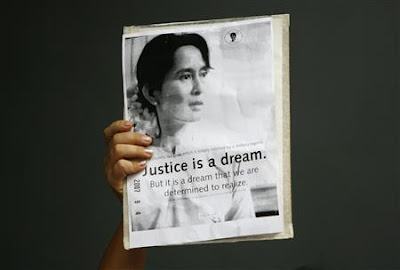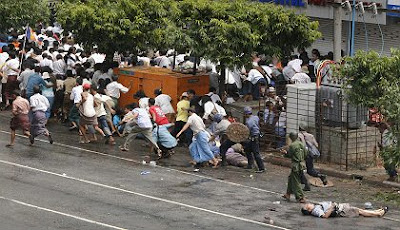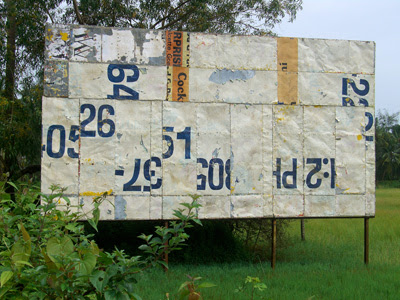 A mobile home being moved into MASS MoCA's Building 5, by John Carli, The New York Times
A mobile home being moved into MASS MoCA's Building 5, by John Carli, The New York TimesAs
MASS MoCA describes on its
blog, the relationship with Swiss artist Christoph Büchel soured long ago. Last summer, Büchel began an ambitious installation that was budgeted to cost $160,000 and was slated to open this December. Housed in a football field-sized building,
Training Ground for Democracy would be a reflection on living in wartime and would include a replica of the "spider hole" Saddam Hussein was captured in, a two-story house, a smashed police car, a rusty oil tanker, and other outsized items.
Long story short, Büchel abandoned the project after a few months, stating that the museum "proved not to be capable — neither logistically, neither schedule- nor budget-wise — to manage the project." MASS MoCA doubled the budget (later offering to throw in an additional $100,000) to entice him to complete the work.
He refused, ratcheting up an ugly standoff between the artist and the institution. He would neither finish the piece nor agree to remove materials from the site -- and he wouldn't let the museum open the installation for public viewing (it did, however, but with obscured views of the project).
After leaving the state, Büchel sent a communique listing demands, which can be summarized by this line: “
The artist demands full autonomy with regard to his artwork.”
MASSMOCA filed suit in an attempt to win the right to show or dispose of the work. Büchel countersued, seeking an injunction against the museum and financial damages. He cited the Visual Artists Rights Act of 1990 (VARA), which protects artists by preventing "the use of his or her name as the author of the work of visual art in the event of a distortion, mutilation, or other modification of the work.”
On Friday, a federal court judge ruled that the museum could exhibit the installation, as long as it clearly indicated it was an unfinished work.
Some, like Yale art school dean Robert Storr (whose affidavit in the case said under no circumstances should a work be shown until the artist deems it complete), have sided with Büchel. But Judge Michael Ponsor questioned who owns the work's copyright in the first place.
The Hartford Courant writes:
While museum workers in North Adams spent months following Buchel's meticulous instructions for completing the work, the judge said, the artist spent only six weeks on site in Massachusetts. The museum acquired most of the objects for the display -- including an oil tanker truck, a Cape Cod house and a vintage movie theater -- and coordinated the complicated task of acquiring cast-off appliances from residents of North Adams. E-mail exchanges between the artist and museum staff included such minutiae as whether a wrecked police car should rest on its side or its wheels.
"I put all of this together and ask myself where is the copyright here?" Ponsor said during questioning in his court Friday. "Who owns the work when what is being created is collaborative art? The museum spent most of the money and did most of the work."
Ponsor toured the exhibition for two to three hours as research for his decision, calling it "the kind of art that wakes you up in the middle of the night."
"I have never been so powerfully affected by a piece of art," he said. "I'm very disappointed that such a powerful piece finds itself embroiled in controversy."
And embroiled it may remain.
MASS MoCA, according to press reports, isn't yet sure when or if the public will have the opportunity to see the work. And Büchel's lawyers Friday said they'd likely appeal the decision.
 The National Press Photographers Association has more on the murder of 50-year-old AFP contract photographer Kenji Nagai by Burmese police. Yes, murdered. A heart-wrenching video on Japanese television shows a soldier or police officer aiming a gun at Nagai and shooting him, point blank, capturing Nagai falling to the ground. "A loud crack is audible as a soldier points his rifle at the prone figure before launching himself at the dispersing crowd of protesters," reports The Times of London.
The National Press Photographers Association has more on the murder of 50-year-old AFP contract photographer Kenji Nagai by Burmese police. Yes, murdered. A heart-wrenching video on Japanese television shows a soldier or police officer aiming a gun at Nagai and shooting him, point blank, capturing Nagai falling to the ground. "A loud crack is audible as a soldier points his rifle at the prone figure before launching himself at the dispersing crowd of protesters," reports The Times of London.













































